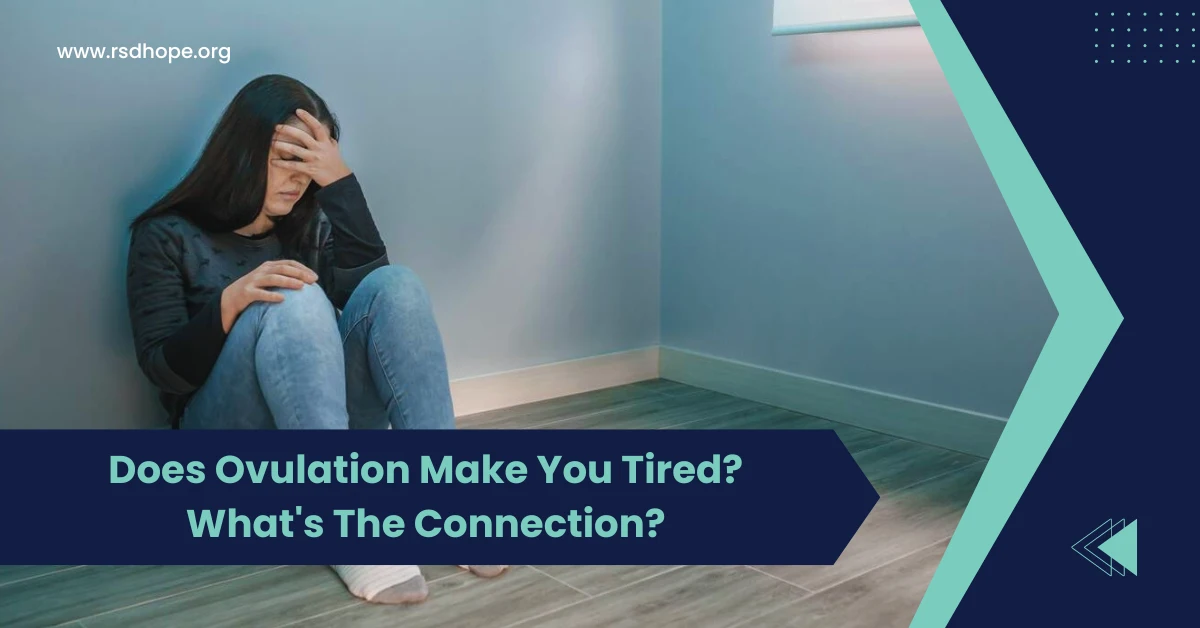Ovulation is a crucial phase in the menstrual cycle, marking the release of an egg from the ovary. While many women are familiar with common ovulation symptoms like changes in cervical mucus or a slight increase in body temperature, fatigue is often overlooked. In this blog post, we’ll explore the connection between ovulation and fatigue, discussing why it happens and how to manage it.
Key Takeaways
- Ovulation can cause fatigue due to hormonal changes, particularly a surge in estrogen.
- Other symptoms may accompany ovulation fatigue, such as bloating or mood swings.
- Lifestyle changes, relaxation techniques, and self-care can help manage ovulation fatigue.
What is Ovulation?
Ovulation is the process by which an egg is released from the ovary, typically occurring in the middle of the menstrual cycle. This usually happens around day 14 of a 28-day cycle, though the exact timing can vary from woman to woman. Hormones like estrogen and progesterone play a crucial role in regulating ovulation, with estrogen levels rising in the days leading up to ovulation and progesterone increasing after the egg is released.
Also Read: Can Birth Control Make You Tired? Unveiling The Link
Does Ovulation Make You Tired?
Many women experience fatigue during ovulation, and it’s a common symptom that often goes unnoticed. The hormonal changes that occur during this phase of the menstrual cycle can indeed lead to feelings of tiredness and low energy. Some women may also experience other symptoms alongside fatigue, such as bloating, breast tenderness, or mood swings.
Causes of Ovulation Fatigue
The primary cause of ovulation fatigue is the shift in hormone levels that occurs during this phase. In particular, the surge in estrogen just before ovulation can contribute to feelings of tiredness. Estrogen is known to have a sedative effect on the body, which may explain why some women feel more tired than usual around ovulation.
Other factors that may contribute to ovulation fatigue include:
- Dehydration: Hormonal changes can affect fluid balance in the body, leading to dehydration and fatigue.
- Poor sleep: Some women experience sleep disturbances during ovulation, which can exacerbate feelings of tiredness.
- Stress: The hormonal shifts during ovulation can also make some women more sensitive to stress, which can contribute to fatigue.
How to Manage Ovulation Fatigue?
While ovulation fatigue can be frustrating, there are several strategies you can use to manage it:
- Exercise regularly: Engaging in moderate exercise, such as brisk walking or yoga, can help boost energy levels and reduce fatigue.
- Maintain a healthy diet: Eating a balanced diet rich in fruits, vegetables, lean proteins, and complex carbohydrates can help stabilize energy levels throughout the day.
- Stay hydrated: Drinking plenty of water can help combat dehydration and reduce fatigue.
- Practice relaxation techniques: Deep breathing exercises, meditation, or taking a warm bath can help reduce stress and promote relaxation.
- Get enough sleep: Aim for 7-9 hours of quality sleep each night to help manage fatigue and support overall health.
It’s also important to listen to your body and give yourself permission to rest when needed. If ovulation fatigue is severe or persistent, it’s a good idea to consult with a healthcare provider to rule out any underlying health issues.
Conclusion
Ovulation fatigue is a common symptom that many women experience during their menstrual cycle. While it can be frustrating and disruptive, understanding the causes and implementing strategies to manage it can help you feel more energized and in control. Remember to prioritize self-care and pay attention to your body’s signals during this time.
If ovulation fatigue becomes severe or interferes with your daily life, don’t hesitate to seek medical advice. Your healthcare provider can help you determine if there are any underlying issues contributing to your fatigue and develop a plan to manage your symptoms.
Read More: Can You Get Pregnant During Perimenopause?
FAQs
A: Ovulation fatigue typically lasts for a few days around the time of ovulation, but the exact duration can vary from woman to woman.
A: While fatigue is a common early pregnancy symptom, ovulation fatigue alone is not a reliable indicator of pregnancy. If you suspect you may be pregnant, take a pregnancy test or consult with your healthcare provider.
A: Yes, it’s quite common to experience fatigue during ovulation due to the hormonal changes that occur during this phase of the menstrual cycle.
A: Some women find that hormonal birth control methods, like the pill, can help regulate their menstrual cycle and reduce symptoms like ovulation fatigue. However, it’s important to discuss the potential risks and benefits of birth control with your healthcare provider.
Sources:

